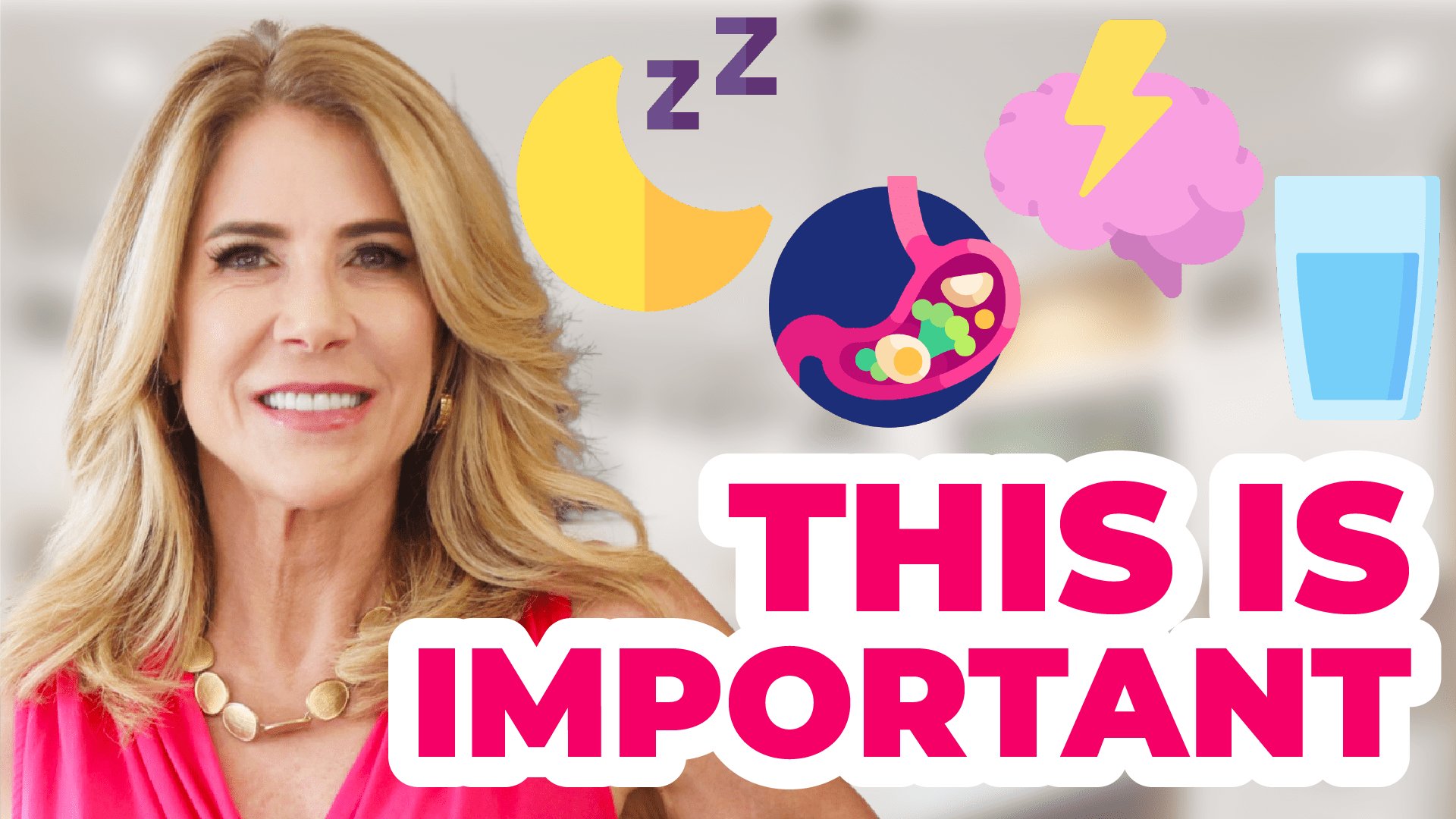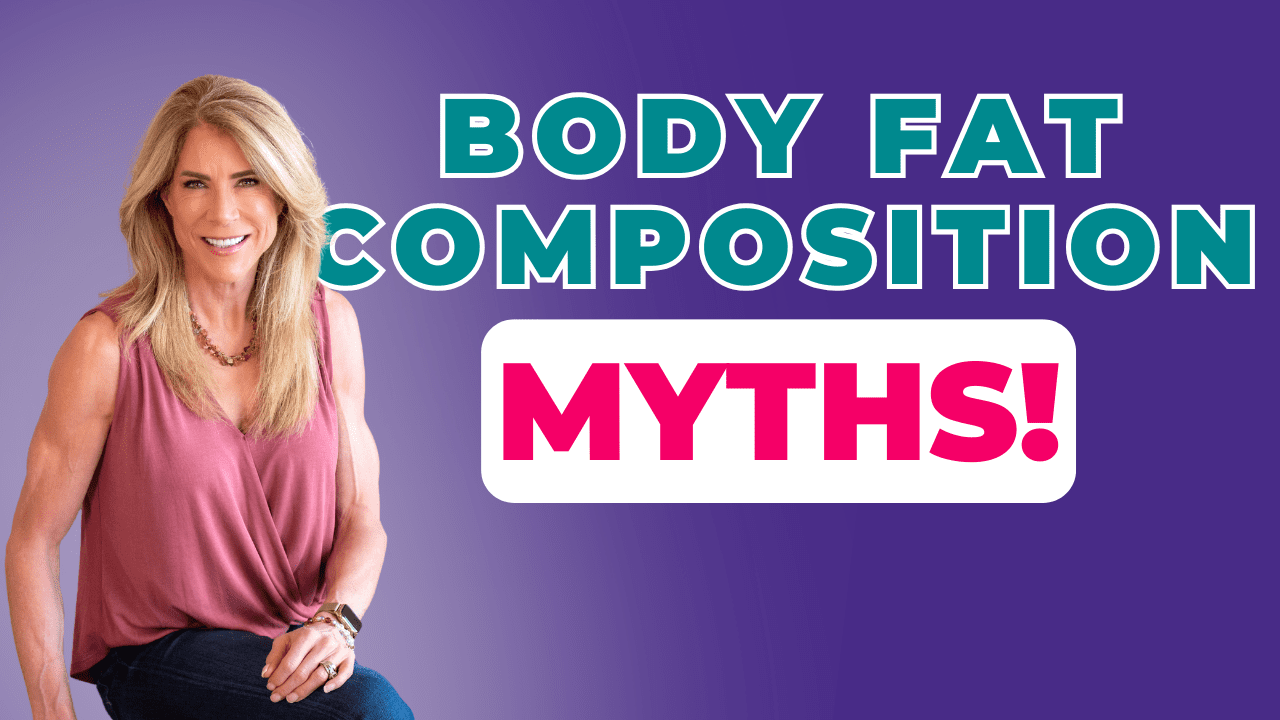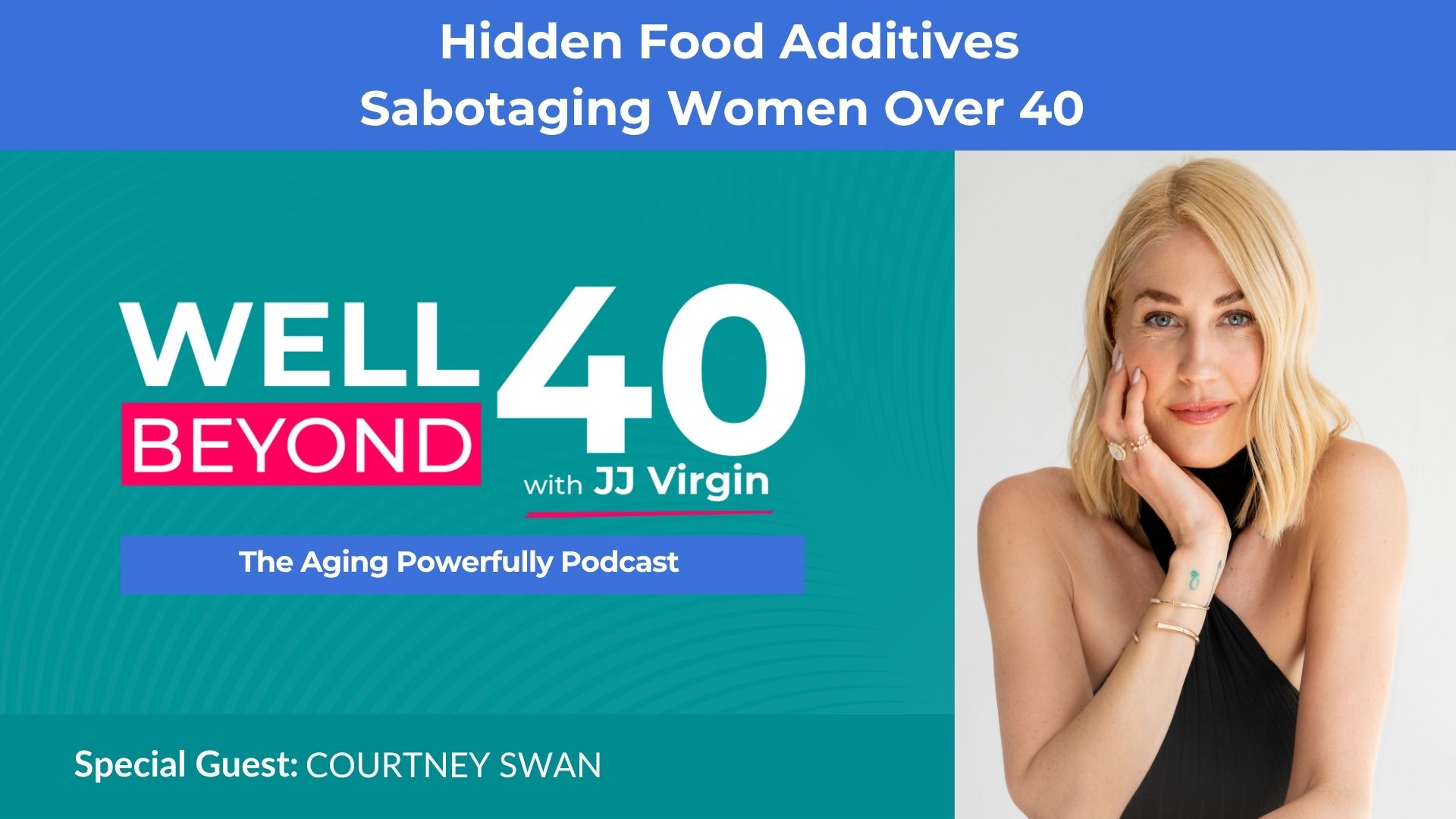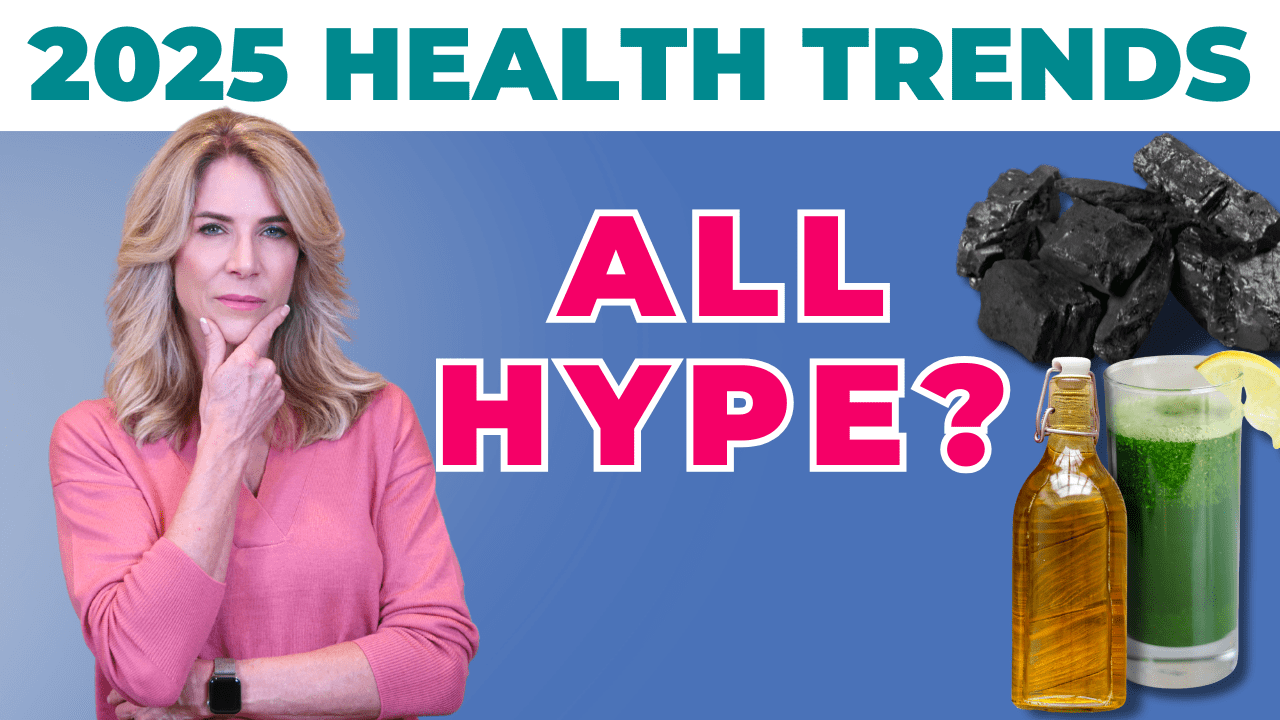Secrets for Hacking Your Metabolism and Burning More Fat
As a woman over 40, you’ve been subjected to a lot of bad advice about fat loss. From crazy fad diets to the fear of building muscle, you’ve been told everything but the truth.
That’s why I’m sharing six truly effective, game-changing hacks for achieving great energy, feeling satisfied, and finally becoming a fat-burning machine. You’ll learn about unexpected triggers for fat storage, the bad habit that can increase insulin resistance overnight, and how to change one thing by only 10% to rev up your metabolism.
If you could hit rewind and tell your younger self a few things about fat loss, you’d definitely want to let her in on the secrets I’m sharing in this episode.
Timestamps
00:01:14 – What’s a macro audit?
00:02:32 – How eating can burn more energy
00:04:15 – Another downside of ultra-processed foods
00:05:57 – How to burn more calories without going to the gym
00:08:00 – An unexpected trigger for fat storage
00:09:55 – This was JJ’s kryptonite for 35 years
00:11:58 – How to increase insulin resistance overnight
Resources Mentioned in this episode
Watch the FULL VIDEO on my YouTube Channel
Track your macros with the Cronometer App
Study: Journal of Diabetes Research: The Effect of Adherence to Dietary Tracking on Weight Loss: Using HLM to Model Weight Loss over Time
Reignite Wellness™ All-In-One Shakes
Study: Food & Nutrition Research: Postprandial energy expenditure in whole-food and processed-food meals: implications for daily energy expenditure
Podcast: What Causes Obesity? with Dr. Richard Johnson
Podcast: The Hidden Biological Switch That Can Be the Source of Weight & Fat Gain with Dr. Richard Johnson
Read Nature Wants Us to Be Fat by Dr. Richard Johnson
Reignite Wellness™ ElectroReplenish
Dr. Joe Dispenza meditations
Study: Nutrition Reviews: Is self-reported short sleep duration associated with obesity? A systematic review and meta-analysis of cohort studies
Video: The Hidden Reason You Wake Up Tired Every Day
ATHE_Transcript_Ep 602_I Wish I Knew These 6 Things About Fat Loss 20 Years Ago
JJ Virgin: [00:00:00] I’m JJ Virgin, PhD dropout, sorry mom, turned four time New York Times best selling author. Yes, I’m a certified nutrition specialist, fitness hall of famer, and I speak at health conferences and trainings around the globe, but I’m driven by my insatiable curiosity and love of science to keep asking questions, digging for answers, and sharing the information I uncover with as many people as I can, and that’s why I created the Well Beyond 40 To synthesize and simplify the science of health into actionable strategies to help you thrive.
In each episode, we’ll talk about what’s working in the world of wellness, from personalized nutrition and healing your metabolism to healthy aging and prescriptive fitness. Join me on the journey to better health so you can love how you look and feel right now and have the energy to play full out. At 100.[00:01:00]
I wasted so much time not knowing these six fat loss secrets sooner, and I don’t want that to happen to you. So let me tell you exactly what you should do to finally lose that fat you’ve been hanging on to for years. Now, the first one is I want you to do what I call a macro audit. You’re going to start tracking.
So here’s the thing. You’ve heard this. That we underestimate what we eat by as much as 40%. And there are multiple studies, like every time I turn around, there’s another study showing that when you track what you’re eating, you lose more weight, you keep it off. I think of one, the Kaiser study that showed that the number one determinant of diet success.
was how much someone tracked. Now, here’s the thing. This isn’t forever, all right? This is why I call it the macro audit. What we are going to use this for is to really get clear on what your body really needs, how it operates at its [00:02:00] best, and we’re also going to make sure that we can get that optimal protein in, right?
That you’re getting the water you need, and that you’re getting the fiber you need, and that you’ve really dialed in the right amount of protein And then you can play around with those fats and carbs so you get to that point where you’ve got great satiety, great energy, and you are a fat burning machine.
Now, in the notes, I’m going to give you a link to my tracking app and also to my Eat protein first calculator so that you’ll know exactly where you need to get started there. The next one is the thermic effect of food. Holy smokes, this is like a gimme. This is like a freebie. You probably heard this, that protein requires more energy to be metabolized and assimilated by your body.
Protein uses about 20 to 30 percent of its calories. In the digestion and assimilation process. Now, a lot of that is when it’s going through muscle protein synthesis, a very, very expensive thing that your body has to do, right? [00:03:00] Carbohydrates, on the other hand, only take about five to 10 percent of their calories to be digested and fat, like it’s basically not even there, it’s zero to 3%.
So, think about what would happen if all you did was increase your protein, like I have you do with eating protein first, and that’s again why I want you to use the protein calculator to determine exactly how much protein you need. Just check below for that. But if all you did was increase your protein to the optimal amount and bumped out a little bit of fat, you will have a bigger thermic effect from that food.
And by the way, you’ll also eat less because here’s what we know. So, when you increase your protein… You also are going to activate these hormones that you’ve heard about that are part of the weight loss like phenomenon going out there. You’ve heard about the weight loss drugs and the fact that they’re GLP 1, Agnes and GIPP Agnes.
Well, so is protein. So protein not only helps with [00:04:00] satiety, it has a bigger thermic effect. It helps with blood sugar control, but it also helps with that 1. Now here’s what’s crazy about just the macronutrient ratios and why I want you to start with tracking and then start playing around here because of this thermic effect.
Ultra processed foods can have a lower thermic effect. And by the way, this can be as much as 50 percent different. So there was a study done. And they compared two different types of sandwiches. Now, first of all, I was like, really? Sandwiches? But they took a white bread processed cheese product sandwich and they compared it to a whole grain bread, real cheddar cheese sandwich.
And what they found was that not only did people overeat when they overate the ultra process, like 500 calories more over ate, holy smokes. But that also they had a lower thermic effect from the food. They did this for two weeks, two weeks, they did the whole foods diet, two weeks, they did the processed foods diet.
They made sure that those [00:05:00] meals were matched for calories and macros and sodium and fiber and sugar and energy density. And that is the big difference. And here’s, what’s crazy. They let them eat what they wanted. And what happened is the people eating the processed food diet gained two pounds during those two weeks.
And they lost two pounds during the Whole Foods Week, right? So here’s the thing. What do we know from this? That when you’re eating more protein and when you’re eating, unprocessing your diet, you will be more satiated, you will eat less, and you’ll have a bigger thermic effect. And one more important thing here about this.
When you eat the standard American diet, it’s low in protein. Can we all agree the RDA is a joke? You need twice as much as you’re getting there. And it’s high in carb and fat. Do you know what that formula really is? It’s an obesogenic formula. Yep. Low protein, like 10 percent of calories, plus high carb and high fat equals fat gain.
So do the opposite. Next one. We think about exercise, I [00:06:00] want to lose fat, I’m going to go exercise, but we don’t think about it as something called non exercise activity. Thermogenesis. Our metabolism. We have our basal metabolic rate, and that’s really, that’s how many calories you burn if you just sat on the couch all day long.
Things that were going to impact that is having more muscle mass and having good thyroid function and not being insulin resistant. If you were insulin resistant, you lower your metabolism, your BMR. Next thing that you can do is exercise. Exercise can raise your metabolic rate like 5 percent over the day.
You’ll probably expend 5 percent more calories. Neat, non exercise activity, thermogenesis can be 10 to 15 percent or more. So what does this look like? This is you finding ways to incorporate more movement into your life. My mantra for you is you’re just going to move more. That means if you’re sitting, Stand.
I’m standing here in front of a stand up desk. It goes up and down. With it, I’ve got a walking treadmill [00:07:00] underneath. So if you’re doing meetings, see if you can just walk on a treadmill or take the meeting and go do a walking meeting. And then track, because of course, as you know, what you measure and monitor, you can improve.
So what do you want to do? Use an Oura Ring, an Apple Watch, a Whoop, and track how much you’re moving. And what I like to do here is take a week and check your average of how many steps you’re getting in a day. And then go, all right, what I’m going to do is I’m going to challenge myself now to increase this by 10%.
Maybe you’ll do that for just a week. Maybe it’ll take you a month to increase it 10%. Once you’ve got that totally dialed, what are you going to do? You got it. Increase it again, because it is always going to be great for you to move more. Now I’m going to throw one more thing in there. If you can happen to move more after you eat, especially go out for a walk, even better because it lowers the blood sugar response to the meal.
The next one, and I did a podcast with Rick Johnson who wrote the book, Nature Wants You to be Fat. [00:08:00] So Dr. Rick Johnson taught me about the fact that when we are dehydrated, we actually will store fat. Here’s what happens. Dehydration causes a little cortisol bump. Now, this doesn’t take much. You can be even 1 percent dehydrated.
Mildly dehydrated. And we know that our thirst apostat stinks. Like, our hunger apostat, hey, that’s overworking. But we never really can tell when we’re thirsty until we’re way too thirsty. So, We’re mildly dehydrated. Our body goes, oh. What we need to do now is we need to take glycogen stored in the liver, those are your sugar stores in the liver, your carbohydrate stores in the liver, and we are going to free them up.
We’re going to convert them into fructose, and we’re going to store them as fat. Why would we do this? Well, I want you to think of the camel going across the desert with the big fat pad. I actually got to ride a camel a couple years ago in Dubai. And yes, big fat pad. Why is that fat pad there? That fat pad’s there because as they start to use [00:09:00] fat for fuel in this long so distance, they free up water.
So it’s effectively their water storage. And so that’s what’s happening with you too. You do not want to be the camel. Now, what do we know too, when you’re drinking water, it actually can boost metabolism for as much as 30 minutes and 30%. So what do you need to do? What’s the takeaway? First of all, you want to drink at least half your body weight in water in ounces every single day, plus four ounces for every 15 minutes of exercise.
And if you live in a hot, humid environment, kick it up a little bit more. What’s your test? Is my pee clear? Now, if you took B vitamins, the test is not going to work, right? But the rest of the time, you should be able to monitor your urine. The other thing that I like to do with my water is add in electrolytes, especially if you’re doing exercise, if you’re in a hot, humid environment.
So I use my electro replenish. I do that one or two times a day. Okay, the next one. Oh, I wish I’d taken this one on way, [00:10:00] way earlier. This was my nemesis. This was my kryptonite. Or 35 years, like that long. So during the pandemic, I decided that I was going to go to a Dr. Joe Dispenza meditation retreat and finally get into meditation.
This had been something I’d struggled with forever. I could not stop my brain from going like, blah, blah, blah, blah, blah, right? And I always was a little bit anxious, a little bit stressed. So I go to Dr. Joe’s first event for a week long, my friends all around me are having amazing results. I’m like struggling with myself and I just decide, you know what, I wouldn’t go to the gym for one week and think I’m going to get fit.
And it’s the same here. I’m taking my nervous system to the gym so that it can handle stress better. And I’m going to give myself six months to get it in shape. And so I just committed for six months. Why is this important? If you are under stress, what happens? That cortisol. It’s catabolic. It can break down muscle, which then raises blood sugar, which then can lead to insulin [00:11:00] resistance.
It can lead to leaky gut, which can lead to inflammation, which can stop muscle protein synthesis. And it can lower serotonin, which can lead to cravings and interrupt your sleep, all problem things. So what was super cool was here I was doing the Dr. Joe work. That’s all I added in. I added in meditating, sitting.
Six months later, I go. I was sitting at dinner with him. I go, you know, I lost five pounds meditating, which is just, I knew the science behind it, but still crazy to see it actually happen. And he goes, yeah, that’s called the no thing diet. Cause he always talks about become no one, nowhere, nobody, no thing.
So. I stress this to you because remember your body’s not a bank account, it’s a chemistry lab and all of these things are powerful information. If your body’s under stress, it’s going to break down your valuable muscle and it may hold on to fat if you’re insulin resistant. You don’t want that. All right.
I talked about how stress can impact sleep. Sleep is a non negotiable. [00:12:00] Just one poor night of sleep, you wake up, you’re more insulin resistant. And remember, if you’re more insulin resistant, that means your insulin is running higher than it should. You cannot access stored fat for fuel. It basically locks the doors to your fat cells.
Your ghrelin is actually higher too. And when your ghrelin is higher, you know what that’s telling your body? Tells your brain rather. It says, I’m hungry. And I’m not hungry for salmon, thank you very much. Get me the Pop Tart, get me the muffin. So what is quality sleep? Quality sleep is somewhere between seven and nine hours of sleep.
I know for me, it’s about eight and a half hours of sleep. And it’s not just how much time you’re in bed. It’s the quality of that sleep, which is why it’s so important to track. I’m a big fan of the Oura Ring for this. I think it’s the best of all of these. None of them are perfect, of course, but it gives you a really good indicator of how well you’re doing.
It’s so important because sleep is when you repair, it’s when you recover, it’s when growth hormone is really coming up. And what’s super [00:13:00] interesting about this, they did a study out of University of Washington where they found that the failure to get the recommended seven to nine hours of sleep every night, even if you’re eating well, even if you were exercising.
Set you up for obesity. Now, maybe you’re getting your sleep in every night, but you’re still waking up exhausted and hello, that is a problem. The quality of your sleep matters and a good night’s sleep starts during the day. So watch this next video on the hidden reason you wake up tired every day. To start getting more restorative sleep that makes you feel energized and motivated to take on the day and keep moving on your fat loss journey.
Be sure to join me next time for more tools, tips, and techniques you can incorporate into everyday life to ensure you look and feel great. And more importantly, that you’re built to last. And check me out on Instagram, Facebook, YouTube. And my website, jjvirgin.com. And make sure to follow my [00:14:00] podcast. So you don’t miss a single episode at subscribetojj.com. See you next time.

 Subscribe to our show
Subscribe to our show 





